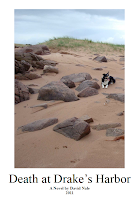 This story begins very slowly and doesn't begin momentum until the third chapter, and from there it takes off like a rocket.
This story begins very slowly and doesn't begin momentum until the third chapter, and from there it takes off like a rocket. Kill Alex Cross contains twin plot lines that intersect and diverge throughout the book. The first concerns the kidnapping of the two children of the President of the United States from their very exclusive private school. The disappearance of the children is frightening enough by itself; what is especially terrifying, though, is that the kidnapper does not want anything other than to taunt the children’s parents.
At the same time, a Saudi Arabian terrorist cell is carrying out a series of attacks against the United States. Hala al Dossari is riding point on them; she is extremely capable, motivated and, above all, dangerous. It is believed at first that the disappearance of the President’s children are connected to the terrorist attacks. But it soon becomes clear that these acts and the kidnappings have been carried out by two separate entities for different reasons.
Cross, with the D.C. Metro Police, soon finds himself in a measuring contest with Secret Service agents. That set of circumstances ends when the First Lady personally requests that Cross be given the highest security clearance possible to aid his search for her children. He eventually discerns both the motive behind the kidnappings and the doer. The problem is that he can’t prove it, at least by conventional means. In order to recover the President’s children --- hopefully, while they’re still alive --- Cross resorts to a course of action that takes him into uncharted behavioral territory, which, even if successful, will almost certainly have repercussions in the future. Meanwhile, al Dossari is on the verge of committing a new and deadly terrorist act that will lead to a series of events even she can’t foresee.
As much as I wanted to say it was an easy read, Kill Alex Cross did ultimately suffer from a few flaws.
The title itself is pretty much misleading, for one. The novel isn’t wholly about killing Alex Cross, it’s about terrorists plotting to destroy America, which although is just a minor flaw, is still noteworthy. Don’t go in expecting a novel about people chasing after our main character, or you will be disappointed.
You don’t feel as though Cross is at risk anywhere in this novel though, and I think that’s true for at least the latter books in the series. You know the main character and his family isn’t going to fall, despite the many times that they’ve flirted with death. The author seems to care about his characters too much, and this is where the novel lets us down a bit
You don’t feel as though Cross is at risk anywhere in this novel though, and I think that’s true for at least the latter books in the series. You know the main character and his family isn’t going to fall, despite the many times that they’ve flirted with death. The author seems to care about his characters too much, and this is where the novel lets us down a bit
There’s even a possible reference to the BBC/Starz series Torchwood in here, which left me smiling, as well as the use of “The Family” as one of the antagonists. Well done, Mr. Patterson, well done.
What Kill Alex Cross is though, is an entertaining read. Patterson is once again proving that he hasn’t lost his touch yet, and manages to still keep the Alex Cross series fresh even after having this many books released in this novel, and the pace is fast all the way through, with no dull moment. You won’t want to skip a few pages in this novel to find out what happens next, and although the ending is a bit anti-climatic with a few plot threads left hanging, you’ll want to stick it out to the end. Although Kill Alex Cross may not be perfect, still it kept me entertained and hooked right the way through (after the third chapter).
Reviewed by Nan Sevic






